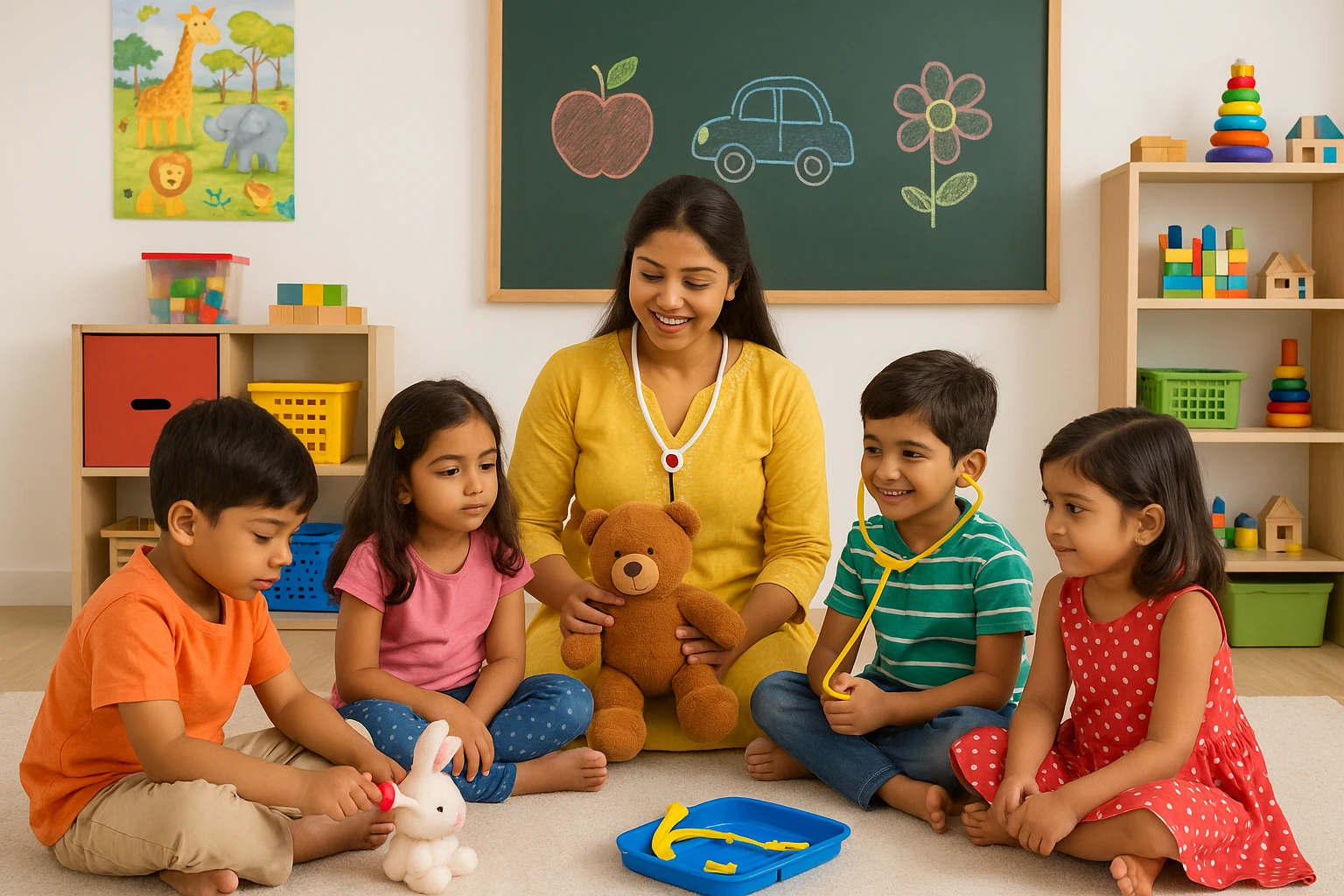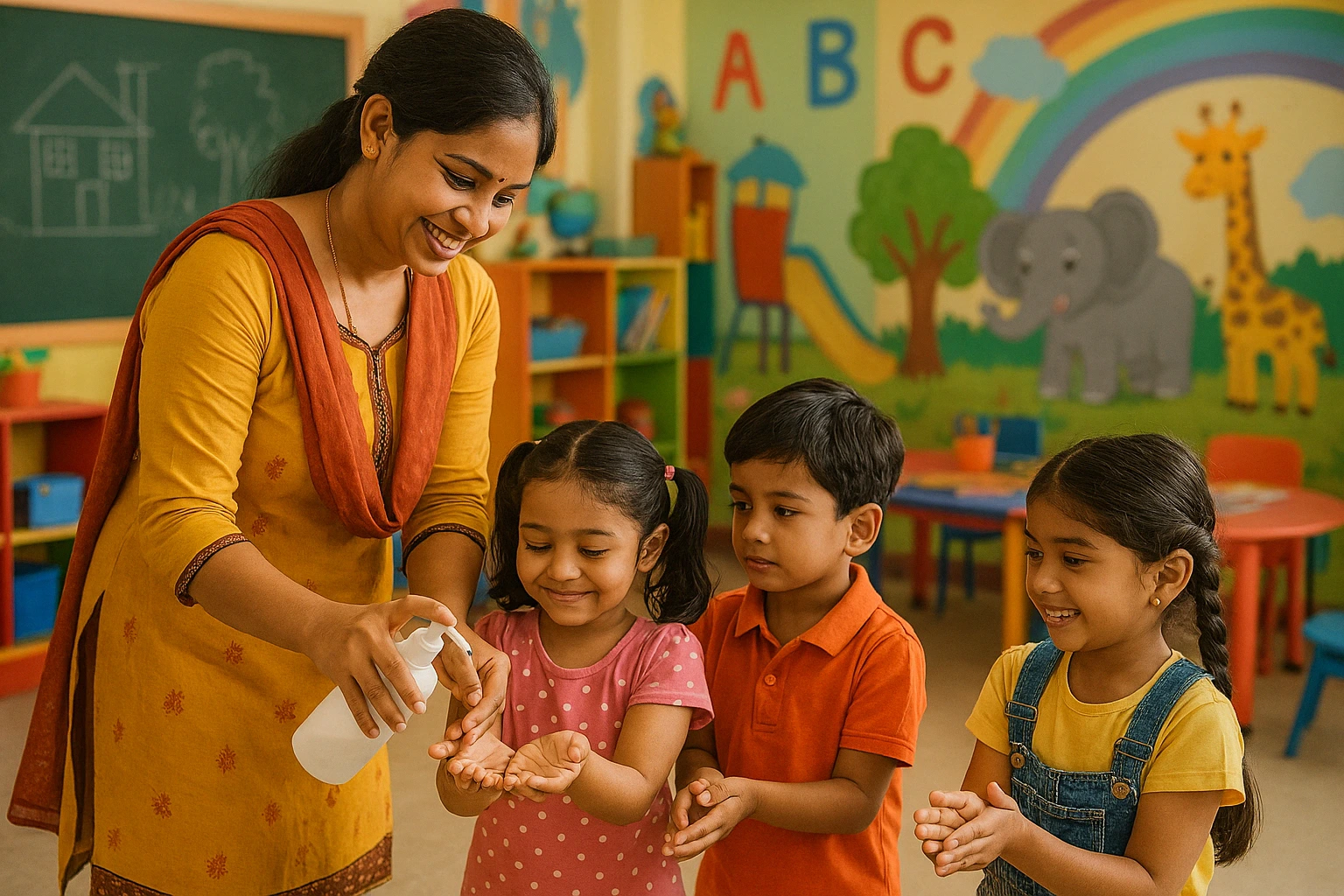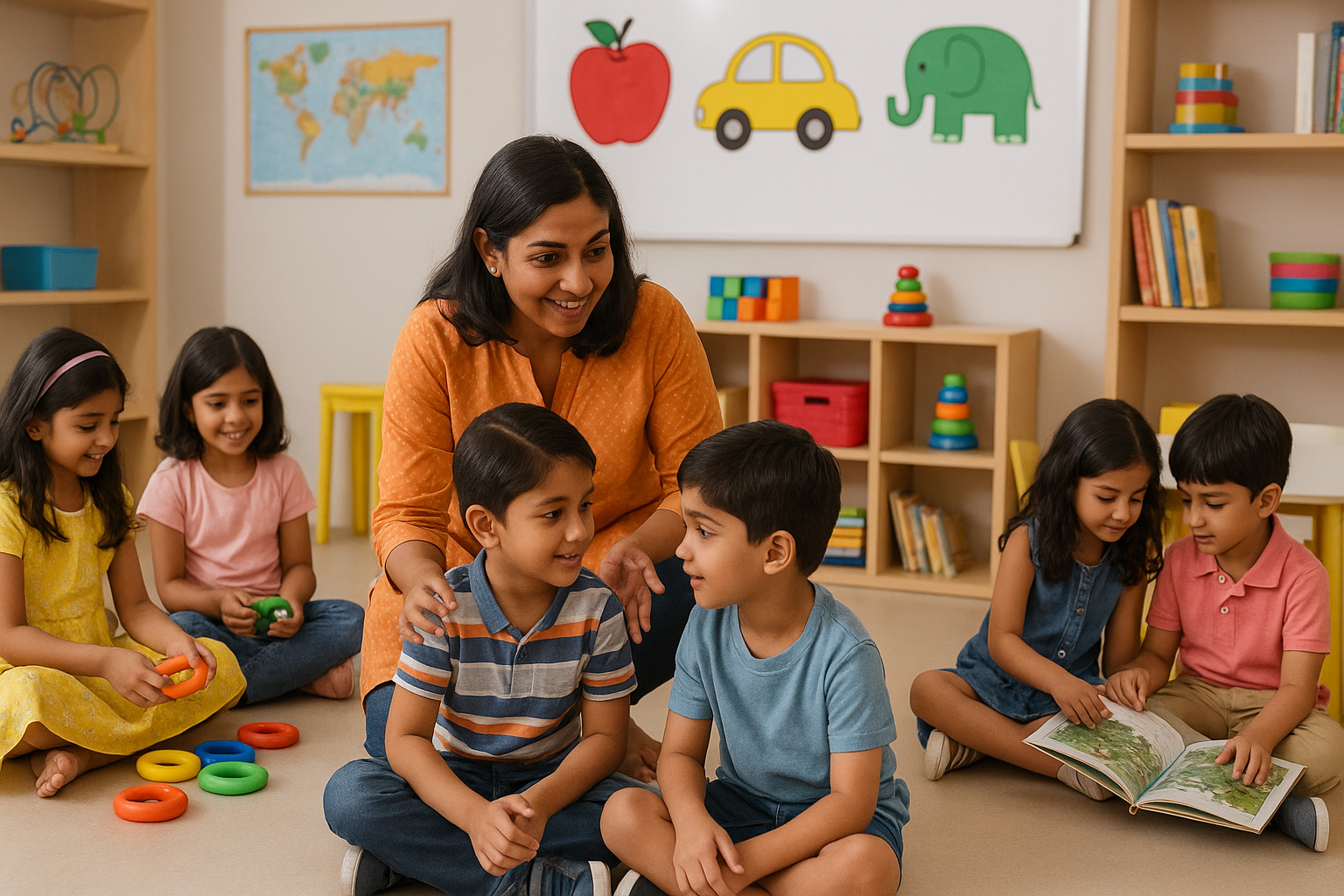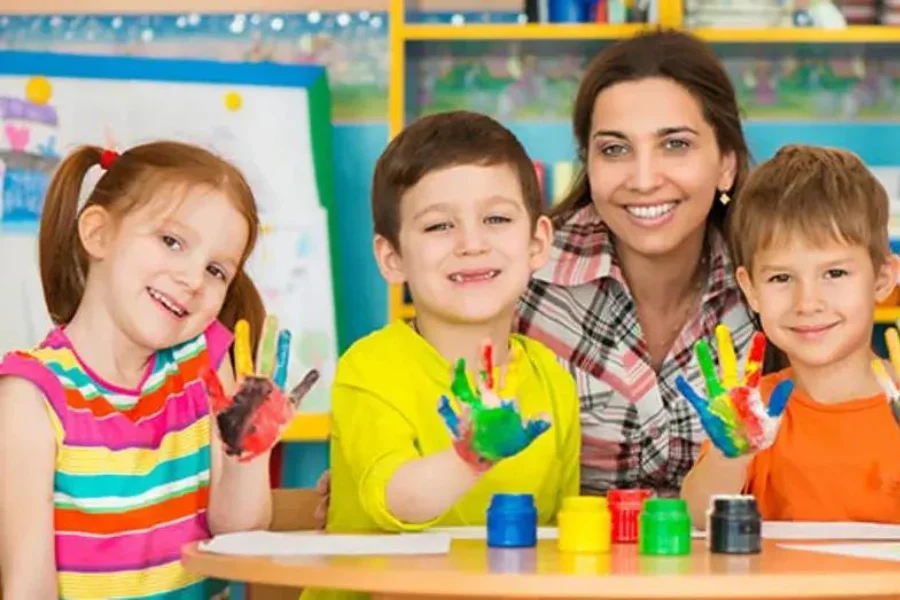Smart Strategies for Effective Early Childhood Teaching
Source: counsellingcoursesforteachers
Smart Strategies for Effective Early Childhood Teaching
Providing the right nurturing and teaching to young children in their early developing years is crucial in Early Education. Educators are trained with smart strategies to support and shape the early learning of preschoolers.
The techniques of effective teaching include creating an engaging classroom learning environment, building lifelong skills with play-based learning, modifying teaching methods to address every learning challenge in the class, and collaborating with parents. These smart approaches build the foundation of effective teaching.
This article explores various strategies in-depth to guide educators towards successful teaching in early education and making a lasting impact on children’s growth.
Table of Content
Create a Classroom that Sparks Curiosity
Curiosity is where exploration begins, and children in their early developmental stage are naturally inquisitive. Early educators utilize this aspect in teaching academic concepts to teachers. With supportive classroom exploration and discovery, children naturally display curiosity, which increases interest in learning
Integration of Engaging Materials:
Using safe and useful materials like puzzles, clay, sensory items, and art materials, teachers can provide children a learning space where they can explore and learn.
Arrange Learning Corners:
By creating a corner where children have access to books for reading, a painting space, and a playing area, build interest for students and allow them to explore activities individually.
Change Displays Regularly:
Transforming the classroom into thematic learning keeps students engaged. Creating a board or displays with colour materials offers a motivating atmosphere to students.
Allow Children to Ask Questions:
While conducting story time or explaining concepts, provide opportunities for children to showcase their thoughts and ask questions. This effective teaching builds the interest, confidence, and active listening of children.
Offer a Supportive Learning Environment:
Creating a stimulating classroom environment that develops children’s curiosity to learn about their surroundings with colourful materials.
Real Material Application:
Integrating the use of diverse tools made out of household materials develops children’s curiosity and is often safer than toys made only for pretend play.
Social Skill Development:
Group activities and collective learning develop respect, collaboration, mutual understanding, tolerance, and healthy relationships among children.
These effective Early Childhood Teaching techniques engage young students with the world around them. Educators apply creative teaching methods that ignite curiosity among children and help them learn to the best.
For downloading the brochure of ECCEd Course, Click Here!
For admission details of ECCEd Course, Call or Whatsapp on +919869546913 / +919869866277.

Engage through Play-Based Learning
Play-based learning is the traditional and most effective approach to early development and learning. Play-based activities are designed precisely considering the safety of children and targeting complete physical development. It supports every growing aspect of children, from cognitive to emotional.
Here’s how play-based learning supports effective Early Childhood Teaching:
Drives Active Participation
Structured play encourages children to actively participate in activities. Playing activities, buttoning, sorting, or coloring develop fine/gross motor skills.
Builds Communication and Language Skills
Play-based learning includes activities of storytelling, fun reading sessions, picture books, or games that help children to communicate and develop vocabulary.
Supports Social and Emotional Growth
In early childhood teaching, it is important to engage children in classroom learning and precisely support their emotional development as well. Fun activities and group play help to express their emotions and build social skills.
Develops Cognitive Skills
Games involving sorting, matching, and counting develop reasoning and strengthen focus. Activities like a treasure hunt and solving puzzles target cognitive enhancement.
Fosters Creativity and Imagination
Life literacy activities like role-play, cooking, colouring, crafts, and many more expand the creativity capacity of children. Innovation and creativity are heart of early education, which makes learning engaging and focused.
Promotes Physical Development
Activities like building, stacking, running, and jumping help develop fine and gross motor skills, supporting overall growth as part of holistic Early Childhood Teaching.
These engaging play-based learning and many more facilities, effective early childhood teaching, and support the inclusive development of children.
For downloading the brochure of ECCEd Course, Click Here!
For admission details of ECCEd Course, Call or Whatsapp on +919869546913 / +919869866277.

Use Positive Discipline that Builds Respect
Along with fun play-based learning, early education primarily focuses on developing positive discipline in young children from an early age. Discipline includes respect, responsibility, organization, structure, and dutifulness.
Below are effective positive discipline strategies used in Early Childhood Teaching that promote a respectful classroom environment
Here are some examples of using positive discipline that builds respect:
Set Clear and Simple Rules
In Early Childhood Teaching, clear rules help children understand boundaries. Establishing structured rules eliminates misbehaviors and maintains discipline.
Consistent Routines
Consistency is essential in Early Childhood Teaching to help children learn from repeated experiences. Constant routines mentally prepare for upcoming tasks in class.
Use Positive Reinforcement
Instead of focusing on the mistakes of children and punishing them, use positive reinforcement by praising positive efforts and good behaviours. In Early Childhood Teaching, this boosts confidence and encourages repetition of good behavior.
Model Respectful Behavior
Children copy their adults; teachers display respectful and cordial behaviours with others and encourage children to follow it. Educators should promote positive actions by doing them personally so that children can enact and develop disciplined personalities.
Build Independence
Early Childhood teaching provides opportunities in class for children that involve taking responsibilities and making decisions. This enhances independence from an early age, making children confident in their actions.
Redirect, Don’t Punish
In Early Childhood Teaching, redirection teaches self-control without punishment. Teachers redirect bad behaviours toward a useful activity, which diverts their focus to positive work.
Adapting and applying these positive discipline techniques in early education teaching makes children well-organized and well-mannered from a young age.
For downloading the brochure of ECCEd Course, Click Here!
For admission details of ECCEd Course, Call or Whatsapp on +919869546913 / +919869866277.

Adapt Strategies for Individual Needs
In Early Childhood Teaching involves observing, recognizing, and supporting diverse learning challenges of young students. Teachers smoothly adjust their teaching styles to address the academic challenge and offer a seamless learning experience to students with special needs.
key approaches that help meet individual needs while keeping Early Childhood Teaching focused and meaningful.
Observe and Understand Each Child
Careful observation of each child’s learning area helps teachers identify any challenges faced by them. With thorough examination, teachers can adapt strategies to support individual needs and improve their shortcomings.
Use Flexible Grouping
Adapting this approach helps in building social connections in class. Teachers can create pairs or groups of children sharing similar interests, which will help enhance mutual respect and trust. And, a child who is more inclined learning individually should be respected and given space.
Modify Learning Materials
Some children need simplified instructions, while others require tactile or visual support. Providing learning materials addressing every learning need creates an inclusive classroom environment with every child attaining success in academics.
Integrate Several Learning Approaches
Visual, auditory, and kinaesthetic methods should all be included in lesson planning. This makes teachers accessible to every student and their learning capacity.
Use Positive Reinforcement
Celebrating every small effort or action of students develops confidence in them to continue their good behaviour. In Early Childhood Teaching, educators praise children’s effort, not just the outcome.
Adapting strategies based on individual needs strengthens the foundation of effective Early Childhood Teaching. Modification of teaching styles not only benefits teachers but also has a positive impact on students’ learning experience.
For downloading the brochure of ECCEd Course, Click Here!
For admission details of ECCEd Course, Call or WhatsApp on +919869546913 / +919869866277.
Partner with Parents for Consistent Learning
Providing structured and supportive early educational teaching to children requires parents’ involvement. Teachers collaborating with parents in a learning journey enhance the overall growth of children. Even parents have opportunities to get involved in academics of their child.
Here are the ways educators can partner with Parents for Consistent Learning
- Regular Updates: Providing timely and precise updates of children’s physical and academic growth to parents is important. This makes parents mindful about their children’s development journey and what needs to be modified in parenting.
- Parents’ Participation in Learning Activities: Early Education involves conducting various activities like yoga sessions, sports, workshops, and classroom learning events, which involve parents’ participation. This encourages students in learning and early education.
- Transparent Communication: Effective teaching involves mutual communication with parents and addressing their concerns. Teachers should maintain an approachable attitude, so parents can connect with teachers regarding the learning challenges of their children.
- Involving parents in learning: In early education, involving parents in the development journey of children is crucial. Teachers can team up with parents to understand any developmental delay or learning challenge faced by children.
- Supporting Parents for Home learning: Guide parents with activities and ideas to support learning at home as well.
- Behavioural Management or Positive Parenting Workshops: Arrange workshops on child development, behaviour policies, phonics, and literacy. This makes parents understand early educational goals and they even they can even implement behavioural management techniques in parenting.
Early Childhood Teaching creates a lasting impact on young learners. With the right tools for children’s engagement and knowledge of modifying teaching, educators enhance the early education experience of children.
Individuals looking to gain early childhood teaching skills then consider enrolling in the Early Childhood Care and Education Course by Vidhyanidhi Education Society (Govt Regd.). To gain deeper insight and practical skills. Take the next step toward building a strong foundation in Early Childhood Teaching through expert-led training and structured learning.
Shape young minds with smart skills—join Vidhyanidhi’s ECCEd Course today!
For downloading the brochure of ECCEd Course, Click Here!
For admission details of ECCEd Course, Call or Whatsapp on +919869546913 / +919869866277.
FAQs
How is Positive Discipline Different from Punishment?
Positive discipline teaches organization, awareness of the consequences of bad behavior, and respect.
Which Course is Best for Early Childhood Education?
The ECCEd Course is the best of early childhood education teaching. It prepares aspirants with advanced teaching methods and tools.





